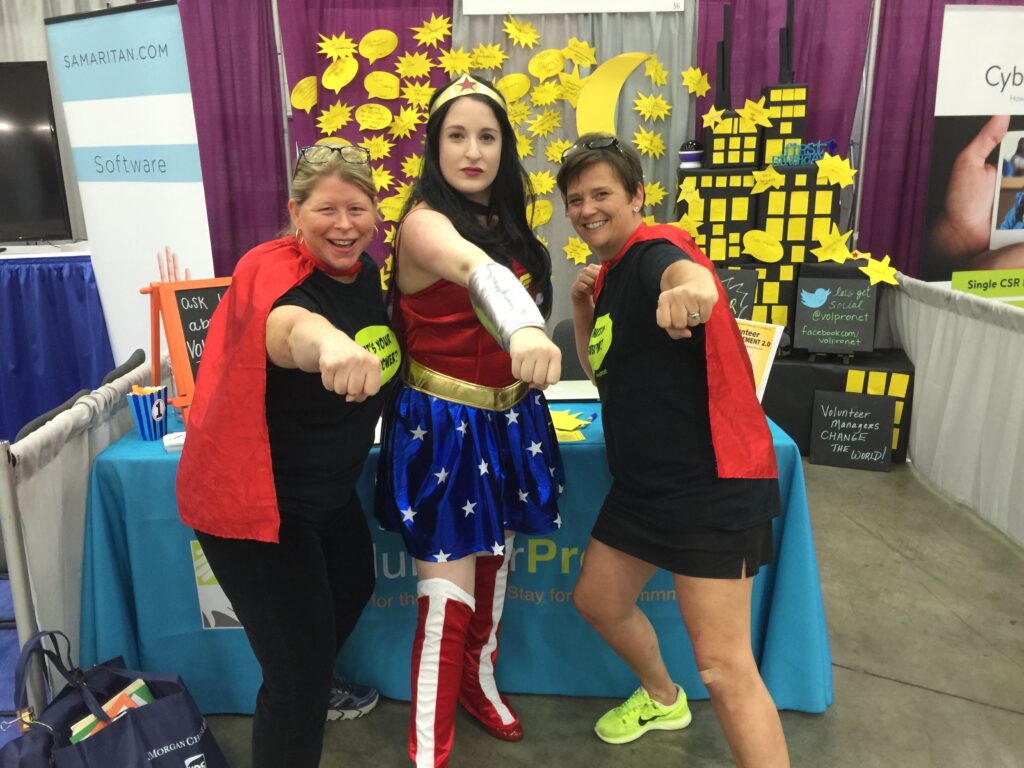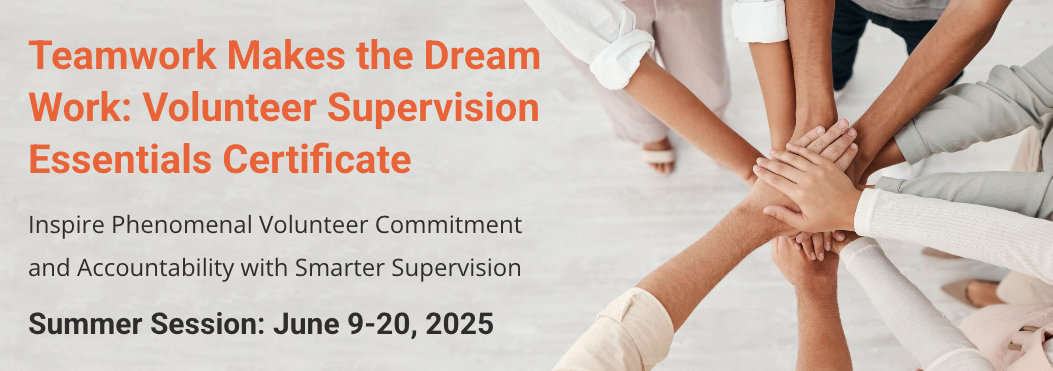What Every Volunteer Manager Needs to Know: A Lesson in Leadership
As a volunteer manager, you are often stuck in middle management and all of the challenges that entail. Not always the best place to be.
But let’s close our eyes for a moment for a little thought experiment (OK technically, you need your eyes open to read this, but go with me anyway).
Now, picture a leader in your mind. Any leader. It could be the leader of your organization. The leader of your country. Or a volunteer manager you admire.
When you have that leader in your mind, think about what kinds of things the leader does? When does the leader do them?
What does the leader say? How does the leader say them?
What does the leader look like?
Does the leader look like you?
In the case of many leaders of volunteers, we tend to focus on the “volunteers” part of the phrase and overlook the “leader” piece. Is it because we aren’t often at the top of the organizational chart?
Or is it since our work is externally focused, our value gets lost on our colleagues, AND on ourselves.
Or, maybe this is an area that, as a profession, we can do better in cultivating.
When you aren’t the key decision maker in your organization, it may be tempting to equate that with permanent follower status.
But what lean, often underfunded agencies need is leadership throughout. On the part of organizations, this requires a potential shift from individual-focused leadership to a more collective approach. This is big-picture strategy and thinking and likely beyond the scope of any single team member.
Fortunately, leadership is not solely defined by org charts and strategic plans. Regardless of whether your organization embraces a collective leadership approach, you have space to lead right from where you are.
John Maxwell famously talks about leading from where you are. This involves owning and developing your influence to lead wherever it is needed – across your organization, up to your formal leadership, and down through your team or volunteers.
When thinking about building your own leadership chops, Maxwell is always a great place to start, but where to go from there? This week’s blog includes four field-tested leadership development ideas that you can work on, no matter where your position sits within your organization.
And the good news is that you don’t need permission from anyone.
None require your boss’ approval, only yours. Your leadership potential is all up to you. These are tools that you, as a leader in the middle, may find useful in shaping your work, your style, and your influence, regardless of your title.
4 Leadership Philosophies for the Volunteer Manager

Concept of psychotherapy, brainstorming and mental problem solving. Vector illustration. Brain with tangled knot and order in man head. Simplifying the complex path. Light bulb idea and scribbles.
While there is no wrong way to lead, there are ways you can be more effective as a volunteer manager.
Read on for a quick overview of four complimentary leadership philosophies that you can develop to gain more support for your work.
Reality Based Leadership
Cy Wakeman studies workplace drama – what causes it, how we inadvertently feed it, and how to root it out. She estimates that the average worker spends 2 hours a day invested in workplace drama, to the detriment of the work, the mission, the organization and, ultimately, the individual.
We’ve all dealt with workplace drama (and if we’re honest, we’ve all also probably been involved in some of it).
The emphasis in Reality-Based Leadership is in owning your own stuff and controlling what you can. This means checking one’s ego at the door and focusing on what you can really know to be true (reality) instead of the story you may be telling yourself (ego, drama).
This approach gives you tools for the next time your boss makes a decision you don’t understand, or your co-worker seems to dismiss your work. Skip over the assumption of disrespect or harm and head straight to what you can control to avoid this feeling again.
The effect of rooting out drama has the double impact of making you more productive and boosting your position as a leader from within. Definitely worth checking out if you ever feel misunderstood or undervalued in your work.
Emotional Intelligence
This is an area you’ve probably heard people talking about as a polarized world has increased calls for empathy. Having emotional intelligence boils down to exercising a level of awareness and control relating to feelings – yours and those of others.
Workplaces, especially those in the nonprofit and governmental sectors, need these skills throughout their staff, especially among team members who interface directly with the public.
There are several authors on this topic, some focusing more on the psychology and understanding of emotional intelligence, and others more on exercising and improving it. Both will serve you in a volunteer management role as leadership in all directions is kind of the name of your game.
Understanding the feelings of your co-workers, boss, team, and volunteers takes a lot of emotional intelligence.
Understanding your own feelings in response to those and the myriad other external factors that interplay with your role can be exhausting. But growing and exercising your emotional intelligence is imperative to establishing yourself as a professional in your organization and on your team.
Strengths-Based Leadership
You know what I love about Strengths-Based Leadership? It boils down to focusing on what you’re really good at. For example, if you’re a whiz in math, don’t go beating yourself up over not having memorized half of Shakespeare’s body of work. Be really good at math!
Put another way, if you are truly inefficient and lousy at data entry, don’t spend countless hours trying to be good at it. Find another way! How freeing is that?
Before you get too excited, you must accept that there are just dreadful parts of every job.
Strengths-Based Leadership isn’t saying you get to shirk those responsibilities because you don’t like them. Instead, it might suggest that you find more efficient ways to resource those responsibilities.
Lucky for you, your very job is to find resources for all kinds of jobs in your organization. Knowing your strengths may very well help you define some of your organization’s volunteer roles.
Additionally, going through the Strengths-Based exercises will give you an appreciation for the strengths of others on your team and where they also might need help from volunteers.
If you become the volunteer manager who can assess the needs of your team members before they can, you are definitely positioning yourself as a leader from within.
Essentialism
This is not specifically a leadership theory, but in the chaotic world of nonprofits and the further chaotic spaces inhabited by volunteer managers, it’s a vital approach to consider. Y
ours is a role that repeatedly gets tossed new responsibilities, sometimes without consideration for how it will impact the time you have available.
Essentialism, or “the disciplined pursuit of less,” gives you the tools to critically think through what’s really important.
You may not always be able to make prioritizing decisions as responsibilities are handed to you by a supervisor, but there are still plenty of things that are under your control.
Using essentialism can help you make way for some of the unpredictable stuff that comes your way, without stretching yourself too thin.
Given our sector, I’d highly recommend studying this set of techniques with your organization’s strategic plan nearby.
If you’ve done a strategic plan for your volunteer management program, have that with you too. Carefully looking at both your obligations and what is truly essential for meeting your organization’s mission and strategic plan gives you two key tools:
- You’re being a leader when you’re using the strategic tools of the organization to shape your decisions.
- You know exactly where your time goes and is needed, so when the next random request comes in, you can have a polite and honest discussion about what other items on your responsibilities list should take a back seat in order to complete the new.
This is advocating for you and your position from a leadership mindset.
How to Advocate for Your Role as a Volunteer Manager
Once you have an understanding of various leadership philosophies and which one works best for you, it’s time to start advocating for your role as a leader.
So, how can you be resilient in an environment that doesn’t always understand how challenging your work is? Or understand the real resource need to do your job well?
I’d like to share a few ways you can think about your role that will give you some inspiration.
Self-reflection
Your work as a volunteer manager is multifaceted. The value you bring is so much more than an extra pair of hands to deliver your agencies mission. You’re mobilizing communities and building bridges between people. Sometimes, people who couldn’t be any more different!
This is especially challenging today, when people are so divided and there is a lot of us vs. them thinking going on.
As a leader you need to know how to bump up against these biases and encourage respectful collaboration across the divide.
How can you do that? With some self-reflection. And not just on your own, with your entire volunteer team.
I would recommend that you fold it into your volunteer training activities, as a type of team building activity that can help people discover hidden similarities.
Maybe it’s values. Maybe it’s hobbies. Maybe it’s food.
The point is, the minute people see that there is something similar to them in another person, they start to see them as a human being who deserves respect, care, and compassion.
Learning to self-reflect will take you, and your volunteers, out of your comfort zones and learn how to find ways to collaborate.
Acknowledge Your Unique Skillset
A few years ago, at the Points of Light conference, I set up a booth for VolunteerPro with a couple of colleagues. The theme of our booth was “what’s your superpower?”
Our Booth At POL NCVS 2016
And that’s the question we asked everyone who walked by.
What we discovered, to our dismay, was that people didn’t believe that they had any superpower as a volunteer manager.
We had to start feeding people ideas! Seriously.
It was baffling! I know this work is challenging, and I know that when you are successful in it, it takes a skillset that is hard to come by.
We were finally able to start getting some answers out of people, and it was great seeing the wide variety of answers come together.
So, why am I telling this story? One of the reasons we asked this question is because we wanted volunteer managers to acknowledge their own skillset, because often we’re so stuck in our day-to-day routine, that we don’t consider everything we bring to the table.
Now I’ve asked this question many times over the years, and here are just some of the responses I’ve received:
- Relationship building
- Project management
- Empathy
- Compassionate
- Understanding of all sides
- Facilitation
- Enthusiasm
- Attention to detail
- Flexibility
- Communication
These are all AMAZING superpowers to have and they should be celebrated! By you, and your colleagues.
Alana Knoppow, Tracy Farr, & Me at Our Booth
So, when you are feeling a bit ambivalent about your ability to act and be seen as a leader, consider this list of superpowers. You ALL have some of these inside you, or else you wouldn’t be successful in this field.
And, when we’re ambivalent about the value we’re bringing to the table we don’t feel like we can step forward and say, look, I’m bringing a lot of value to the table and I’m going to need to get some respect for it. And I’m going to need to have XYZ.
What does this lack of respect mean in concrete terms? It means you’re not getting invited to important meetings, your resource requests are denied, or a colleague might refuse to work with volunteers in their department.
If people are not allowing you to do your job, you are not going to be as productive, and your organization’s outcomes will be negatively impacted.
Have Conversations
No matter how much mindset work you do and how much advocating you do for your role, you will come across some people who just don’t get it.
In this case, the best thing to do is take them out for a cup of coffee (or if that’s not possible, a one-on-one Zoom call!).
Frame the conversation as you wanting to talk about your volunteer program and get their ideas on it.
When you are talking with them, ask the following questions:
- How can our organization meet our mission more effectively by engaging volunteers?
- What are our most critical gaps right now?
- Where do we have a lack of resources, knowledge, skills, etc.
When you know how they think about these challenges, you can broaden the conversation with ideas on how volunteers might be the answer to their concerns and invite collaboration.
Our Best Advice: Lead from Where You Are, Volunteer Manager
This is far from a comprehensive list, but hopefully a good starting point if you’re looking to firm up your leadership skills and perception. Leadership work is often focused at the top of an organization chart, but its leadership from within that is driving today’s nimble and successful agencies.
Embrace the leadership that is inherent in your role. Establish it if it’s not already accepted in your organization. Hone your skills and demonstrate the respect that you desire for your position. Read and read. And then square your shoulders and lead.
I expect that the next time someone asks you to imagine a leader, it will be yourself that you picture.








